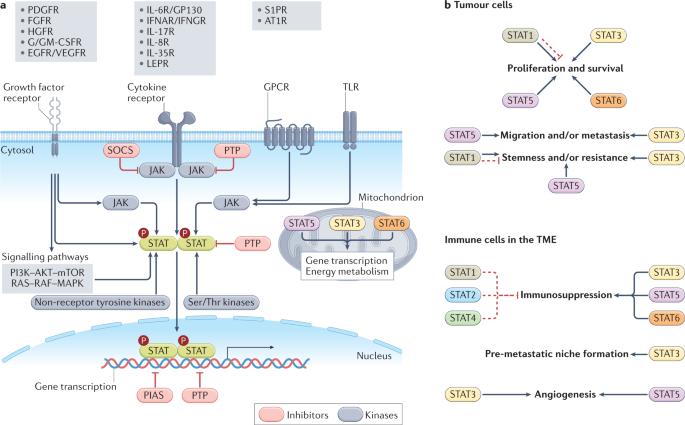STAT proteins in cancer: orchestration of metabolism
IF 72.5
1区 医学
Q1 ONCOLOGY
引用次数: 17
Abstract
Reprogrammed metabolism is a hallmark of cancer. However, the metabolic dependency of cancer, from tumour initiation through disease progression and therapy resistance, requires a spectrum of distinct reprogrammed cellular metabolic pathways. These pathways include aerobic glycolysis, oxidative phosphorylation, reactive oxygen species generation, de novo lipid synthesis, fatty acid β-oxidation, amino acid (notably glutamine) metabolism and mitochondrial metabolism. This Review highlights the central roles of signal transducer and activator of transcription (STAT) proteins, notably STAT3, STAT5, STAT6 and STAT1, in orchestrating the highly dynamic metabolism not only of cancer cells but also of immune cells and adipocytes in the tumour microenvironment. STAT proteins are able to shape distinct metabolic processes that regulate tumour progression and therapy resistance by transducing signals from metabolites, cytokines, growth factors and their receptors; defining genetic programmes that regulate a wide range of molecules involved in orchestration of metabolism in cancer and immune cells; and regulating mitochondrial activity at multiple levels, including energy metabolism and lipid-mediated mitochondrial integrity. Given the central role of STAT proteins in regulation of metabolic states, they are potential therapeutic targets for altering metabolic reprogramming in cancer. Reprogrammed metabolism is a hallmark of cancer. Here, Li, Zhang and colleagues describe how signal transducer and activator of transcription (STAT) proteins alter cancer cell metabolism by sensing and transducing signals from the tumour environment and modulating signalling pathways, transcription factors, mitochondrial proteins and enzymes.

癌症中的 STAT 蛋白:协调新陈代谢
新陈代谢重编程是癌症的一个标志。然而,癌症的代谢依赖性,从肿瘤发生到疾病进展和耐药性,需要一系列不同的重编程细胞代谢途径。这些途径包括有氧糖酵解、氧化磷酸化、活性氧生成、新脂质合成、脂肪酸β-氧化、氨基酸(特别是谷氨酰胺)代谢和线粒体代谢。本综述强调了信号转导和激活转录(STAT)蛋白,特别是 STAT3、STAT5、STAT6 和 STAT1 在协调肿瘤微环境中癌细胞、免疫细胞和脂肪细胞高度动态的新陈代谢中的核心作用。STAT 蛋白能够通过以下方式形成调节肿瘤进展和耐药性的独特代谢过程:传递来自代谢物、细胞因子、生长因子及其受体的信号;确定基因程序,以调节参与协调癌症和免疫细胞代谢的各种分子;以及在多个水平上调节线粒体活性,包括能量代谢和脂质介导的线粒体完整性。鉴于 STAT 蛋白在调节代谢状态中的核心作用,它们是改变癌症代谢重编程的潜在治疗靶点。代谢重编程是癌症的一个特征。在这里,李、张及其同事描述了信号转导和激活转录(STAT)蛋白如何通过感知和传递来自肿瘤环境的信号以及调节信号通路、转录因子、线粒体蛋白和酶来改变癌细胞的新陈代谢。
本文章由计算机程序翻译,如有差异,请以英文原文为准。
求助全文
约1分钟内获得全文
求助全文
来源期刊

Nature Reviews Cancer
医学-肿瘤学
CiteScore
111.90
自引率
0.40%
发文量
97
审稿时长
6-12 weeks
期刊介绍:
Nature Reviews Cancer, a part of the Nature Reviews portfolio of journals, aims to be the premier source of reviews and commentaries for the scientific communities it serves. The correct abbreviation for abstracting and indexing purposes is Nat. Rev. Cancer. The international standard serial numbers (ISSN) for Nature Reviews Cancer are 1474-175X (print) and 1474-1768 (online). Unlike other journals, Nature Reviews Cancer does not have an external editorial board. Instead, all editorial decisions are made by a team of full-time professional editors who are PhD-level scientists. The journal publishes Research Highlights, Comments, Reviews, and Perspectives relevant to cancer researchers, ensuring that the articles reach the widest possible audience due to their broad scope.
 求助内容:
求助内容: 应助结果提醒方式:
应助结果提醒方式:


